#I love and hate it in equal measures. it’s not what I strove for when I first thought of it and I’m conflicted on liking it
Explore tagged Tumblr posts
Text
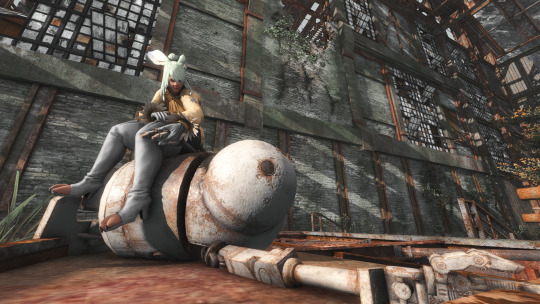
Is this our fate? To be discarded by humanity when we’re no longer deemed useful?
Who am I even more like, anymore? A sentient being with the body of a machine- what even am I, now? Did they grieve for you, or was it quiet and lonely? Did it hurt, can you even feel pain? I’m here now. I’ll remember you too.
#this wasn’t- I didn’t mean to make this The Future prompt but then the-#ffxiv Viera#ffxiv Tuesday#Tuesday Gears#Tuesday has a lot of introspection OFTEN. do not leave him alone. he WILL become strange.#I have complicated feelings about this pose#I love and hate it in equal measures. it’s not what I strove for when I first thought of it and I’m conflicted on liking it#ffxiv screenies#ffxiv screenshots#this WAS originally going to be day 29 but then I scrapped it in favor of a continuation set with past present future#I’m still not 100% happy with this but I spent so long on it letting it rot in my drafts for eternity#seems like a shame. so. releases it into the wild with my original captions sndnfnds
8 notes
·
View notes
Text
Go Watch the Venture Brothers
So just heard the complete and utter Bullshit news that Adult Swim has cancelled one of (if not the best shows) they have the Venture Bros. This series is one of those shows that for WHATEVER reason never got to the level of fandom Rick and Morty has even though they’ve been at the genre parody game longer and in my opinion better.
The series is about Rusty Venture former boy adventurer and failing super scientist who in an attempt to keep his head above water in debt goes around with his two boys Hank and Dean, and bodyguard Brock on misadventues while various legal archnemisis go after him, such as the Monarch.
So if you never watched or never heard of this 7 season series let me give you a break down on why you should,
1) Art Style & Animation
Venture bros is one of those rare Adult aimed animated series that that really truly tries to utilize their medium to the best of their abilities. Season 1 had like such a small budget and corners had to be cut so it can be a little hard to watch at times.

But with each passing season they get a little better, a little more fluid, go just a little harder and it truly feels rewarding to watch. Like seeing an artist you follow online improve over the years. Like they COULD have stayed with the choppy and stiff animation from season 1 it fit right in with its fellow adult animated shows but it didn’t. They strove for quality to have something that matched the story they were telling.
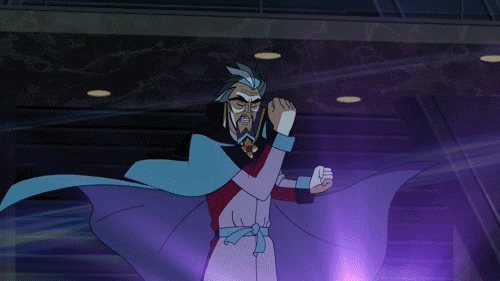
2) The Writing
Venture Bros has some of the tightest and consistently great writing of ANY serialized show I’ve seen, adult, animated or other wise. Wanna know why? Cause it’s all done by TWO people (save for like one ep each season where one other person is allowed to touch their baby). Yeah TWO people and they work their asses off every season to interject, humor, refrences, parody, plot and character development in equal measure.
3) Character Development
Um yes in case you were wondering that’s right an adult animated show has CHARACTER DEVELOPMENT that holds as the series goes on. Not to give spoilers but characters will go through changes in alignment, relationships will develop and change, some characters will go through negative arcs where they are straight up unbareable for a season before coming out the other side even better than they were before. There is no end of epsiode or even end of season reset. Characters, settings, and dynamics all change over the course of the show and it feels just so god damn good.
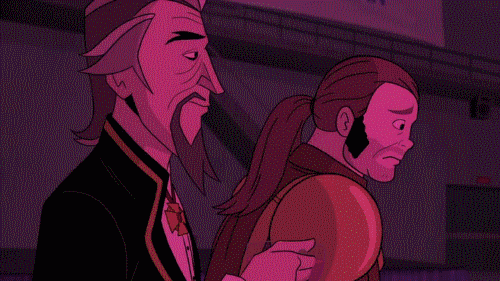
4) Story Development
Just like the characters the story of the Venture Bros grows and changes each season. Things that are set up even as early as season one are paid off as the series goes on. Like not to be that bitch but you know how RIck and Morty teases an overarching plot ALL THE TIME but like will often just spit in the face of fans hoping for more than like one episode a season addressing it? Yeahhhhhhh that doesnt happen here, fans are consistently rewarded for putting the time in to rewatch and really think about what happened in the series. Characters that are seen in the background or are just referenced by other characters will be brought in to be recurring characters, things that start off as a small detail or gag will be given larger relevance and each time they do this you get that “OH I remember that from last season! So thats what it was!” The writers WANT you to rewatch, they WANT you to analyze and they WANT you to theorize, and they give you a show that gives back the time you put in.
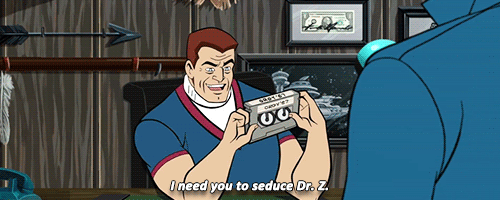
5) Parody & Reference
This series does a great thing with parody. They make real characters who are just as enjoyable as the characters they parody, they make story lines that both poke fun at the absurdity of the media but shows the writers love for it. So often parody and references are just used to mock the thing but with Venture Bros you feel the love and care so when you know the thing being parodied you can laugh but feel good about laughing cause they are never laughing at a thing maybe you cared for in your youth but rather laughing with it.
And it’s never just one thing. When they parody a thing its often layered with other things to make it even more unique. Scooby-Doo is overlayed with famous criminals, Laura Croft is mixed Dr. Quinn Medicine Woman, GI Joe is given the look of the Village People and so on. They never go for the easy joke or reference. Hell theres an episode that starts with them reciting the lyrics to David Bowies Space Oddity for really no reason other than they could. They weave these things in naturally with their setting and characters so nothing feels out of place. Like if you dont catch a reference or parody you dont feel like “I think this isa reference to something?” like a LOT of things do not just adult animated shows. You arent taken out of the moment cause it all feels so natural.
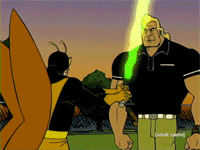
6) The Characters
God damn these characters, I could go on for hours about these characters. From main to one off these are some of the most likeable characters you can find. I mean it when I say I can’t think of a single character I wish they had cut cause they are all so well created. Even the ones I hate i have fun hating cause they were made to be that way. I’ll be good though I’ll only talk about my absolute top faves.
- The Monarchs

You ever sit and wish villain couples could have functional healthy relationships? Well look no further than Malcom Fitzcarraldo aka The Monarch and Dr. Shelia Girlfriend (yes that is her last name). The Monarch is a high strung impulsive saturday morning cartoon villain whos tendency to over react is only matched by his unspecified hatred of Dr. Venture. And Dr. G is his nonsense partner in crime who will cut a bitch if they don’t play by their admittedly weird rules. Both characters are great on their own but are better together. Though that doesnt mean they always get along. Like a real couple they have their ups and downs they fight, break up, make-up and grow stronger in their relationship with each season.
- Shore Leave
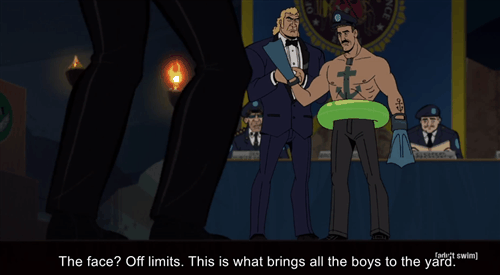
Ok ok so I want you to imagine James Bond, mixed with GI Joe simmering in a cocktail of the most flamboyant gay men you have ever seen and you have one of my favorite gay characters/characters in general. Shore Leave is a member of OSI (the shows SHEILD/GI Joe parody organization) he’s loud, brash, flippant, sassy and highly competent at his job loving every second of getting to beat bad guys down within an inch of their life. I love seeing him play off the stoic Brock and the two have this great brotherly dynamic that’s never called into question. He also gets to have a very cute romance with Al the Alchemist (who is also great). I could talk about this man all day.
- Dr. Rusty Venture

They did such a good job with this man. He’s a self serving, sexist, perverted, whinny, self important asshole and yet you feel pity and genuine sympathy for him and want him to succeed. You can see how Dr. V was given a raw deal by his father who seemed to care more about his adventures than his sons well being and how this molded him into the bitter man he is today, but on the flip side you can see where he chose to use that as a crutch for his worst behaviors and impulses. Seeing him slowly grow and change and be an actual good father to his boys while all the while still be a giant dick is actually really great.
- Dr. Byron Orpheus
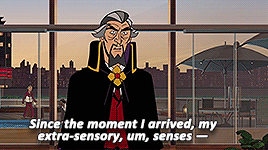
Ahhhhh Dr. Orpheus part Dr. Strange Parody part busybody stay at home dad, he’s just such a delight. Dr. Orpheus is a divorcee, with an unfulfilling job of maintaining order to the cosmos (which isnt as hard as one might think), and uses his magical ablities in ways most of us would (ie menial tasks and home chores). Overly dramatic and affectionate Dr. O is a delight whenever he appears, but he’s at his best around his daughter and old friends The Order of the Triad.
Again I can go on but all these characters ranging from main to recurring are crafted with the utmost care for you to want to see them succeed or fail, to see them again even if you know it’ll never happen, and want them to cross paths with other characters.

The Venture Bros is one of those series that I will ALWAYS recommend even to the pickiest of humor tastes. But if you don’t believe its as good as I said or don’t think the concept is to your tastes I’ll recommend a few eps that I think best show off the base idea of the series without giving much away. In terms of plot and spoilers, though somethings wont make a lot of sense.
- S1 ep10 "Tag Sale – You're It!" - Dr. V is having a yard sale so of course all manner of costumed weirdos show up. - S2 ep5 "Twenty Years to Midnight" - basically a fetch quest around the world to save the planet with daddy issues - S3 ep2 "The Doctor Is Sin" - Again daddy issues but with one of the best recurring characters and a great showcase of the series deeper emotional plots - S4 ep6 "Self-Medication" - Really embraces the parody as Rusty goes to a former boy adventurer support group. Anyway the show is 7 seasons with 80 episodes, please go watch it. I will never forgive @adultswim for cancelling what was to be their final season. And in closing GO TEAM VENTURE!
#venture bros#the venture bros#venture brothers#adultswim#adult animated shows#animated shows#animation#go watch this show#go watch#adult animation
1K notes
·
View notes
Text
Strive Pt. 19
{PART 1} {PART 2} {PART 3} {PART 4} {PART 5} {PART 6} {PART 7} {PART 8} {PART 9} {PART 10} {PART 11} {PART 12} {PART 13} {PART 14} {PART 15} {PART 16} {PART 17} {PART 18}
Pair: Tomarry
Rating: M-E(depends)
Tags: Mild Language, Homosexuality, Sexism, Obsessed Tom, Time-Travel/Dimension-Travel, Teacher/Student, Eventual Romance, Teacher-Harry, Grey!Harry, MoD(sort of), Death!being,
Tom began enforcing his demands over his fellow Slytherins. The end of the year exams were coming sooner than any of them would like to think, and for the seventh years that meant their N.E.W.T.s. And as those were always more difficult, they required more studying and consideration than anything else at present.
He wanted the entirety of Slytherin to do well on their exams. Even the somewhat challenged students were expected to scrape by with Acceptables because he refused to have his minions poorly representing him in any manner. And they all knew that if there was so much as one Troll, all hell would be set loose upon them.
Their reviews in class had become more intense as well.
Professor Potter had been the most strict with them because he expected more out of his students than any other teacher had during Tom's time at Hogwarts. He had a mental scale of where seventeen/eighteen year olds should be in terms of magical skills and put them to the test during every class and every club meeting. He pushed them harder than he ever had before and didn't accept excuses.
The interesting thing about his teachings, was that he focused a lot more on defensive tactics even while using offensive spells. Potter didn't want anyone to end up stranded should they somehow get caught in the crossfires of Grindelwald's forces. He wanted to arm them with the means to escape such a situation should it potentially arise, but he did not want them to have to fight for their lives.
And Tom hadn't minded when he realised just what the man he admired was doing. Potter actually cared. Sometimes it felt like the teachers truly didn't care about the students because they were just passing faces. Within seven years this batch would be gone and would be replaced like always. Every school was a revolving door basically. But it was obvious that Potter cared and was trying his best to help their future endeavours.
The man had been new but was sacrificing sleep and time because he wanted to help the students learn more easily. Because he wanted them to actually reach the potential they all possessed. Because Potter saw something in each and every student and decided that it was something worth his attention. Something worth the amount of effort he put in to help them.
Personally, Tom couldn't say he saw the same, but he at least appreciated that Potter would be so optimistic. Even when optimism seemed pointless sometimes. At least Potter had faith in his students. And he didn't judge them based upon prior actions of theirs.
All Tom needed to do was to study as much as possible in between all the small tutoring sessions he'd been giving to the younger students who'd been paying for his help.
He really needed to become a teacher. There was just something about watching people succeed because of him. And he knew it was because of him since so many of those students would still be utterly hopeless without his aid.
Tom had to make sure that when he came to Hogwarts to apply for a job, he did it when Dumbledore wasn't around so he couldn't attempt to interfere. And he knew very well that Dumbledore would no doubt try to put a wrench in his plans even if he didn't know what they were exactly.
The Slytherins were whispering thanks to the recent article in the Daily Prophet. Dumbledore had been landed with major fines though the details had remained private. Still, the knowledge of his suffering made many hearts feel lighter as the N.E.W.T.s drew nearer. The Slytherins were espeically pleased with this information since it felt like the man was finally getting his comeuppance after years of being an arsehole with contradictory views.
Dippet was constantly on edge during meals recently, and it probably had to do with how he hated confrontation. The man was like a wet doormat and didn't really like doing much of anything. He was also relatively easily to manipulate if one knew how.
His former Deputy being investigated made him look bad for never noticing anything he had done before Lord Malfoy lodged a complaint. And people liked to talk in the wizarding world. No one was a stranger to rumours and Tom had heard a few people wondering none too quietly, if he'd been in on Dumbledore's actions because Dumbledore was so famous so he'd get away with more than others would. Had Dippet possibly turned a blind eye to his attitude because of who Dumbledore was? Or had Dumbledore bribed him somehow?
This left the man in a precarious position and he had to tread carefully lest he lose his own job.
Truthfully, Potter would be a better Headmaster than anyone else on the staff.
"Thank Merlin that it's all over!" said Abraxas as he pretended to faint onto one of the green sofas of the Common Room. "I never want to see another book or piece of parchment every again!" he cried dramatically.
"If you wish to become the Lord of your House you'll have to suck it up," said Nott blandly, holding up the very thing Abraxas claimed to never want to lay eyes on again. "Otherwise I'm certain your parents will gladly try for another child if it bothers you that much."
There was a shared look of disgust from all but Tom, who didn't care enough about things not about him to be emotionally invested in them. Tom was busy reading through the review he'd made for his Charms N.E.W.T. and nodded to himself as he noted every single thing that had been asked on the Theoretical exam. And then of course the Practical where he'd scored an extra point for his Corporeal Patronus.
That same day, he'd also taken his Transfiguration N.E.W.T. and he'd gotten an extra five points because of his Animagus form.
Yes, Tom had succeeded! Months ago he'd done the entire ritual to the exact measure and had finally managed to figure out his Animagus form. No surprise, it was a snake. And use of the Room of Requirement allowed him to make use of a room full of mirrors so her could see just what kind of snake he was.
He was an all-black Horned Viper with equally black eyes to show that he wasn't a natural serpent. Horned Vipers weren't black. They were usually shades similar to sand or dirt in order to camouflage themselves more easily. He had two pointed horns atop his head as well as had the venom the common serpents of the species possessed. He was sure of how to use it yet but he'd get there eventually.
And when he Transfigured himself right in front of the examiner, the woman had tittered with excitement and called him a genius as she batted her lashes in exaggeration. She also handed over a form for him to fill out so the Ministry could register him immediately. He'd received high praise for his accomplishment since not many magicals even attempted to become Animagi and certainly never before graduation.
He'd put in the time and effort and while he'd attained his form months back, he'd practiced consistently in order to officially debut it for his N.E.W.T. exam. That way he could do it on command and it seemed more impressive that way.
Perfection was what Tom strove for. Among other things of course.
He'd been assured that he'd set the record for the youngest Animagus in British history. It was a pleasing piece of information and made his day all the better.
Tom always did love succeeding.
And at some point in the future he would have more time on hand to fully explore what he was capable of when in his snake form. He could imagine all the spying possibilities!
Tom entered Professor Potter's office with slight trepidation. He didn't actually know why the man had called him over, but he knew it at least had to be important.
The man was seated as usual, though his hair was a bigger mess than it usually was, and he looked so very tired. Like he was out on the front lines of either war and was just done with everything. There were literal lines on his face.
"Mr. Riddle, I know it's a bit sudden to just be calling up up here but I felt it urgent to speak with you."
"Is this about my N.E.W.T. score, sir?" No one could blame Tom for being worried around his grades. They were the most important things to him at present. All Tom really had to his name was his intellect. And Parseltongue, but for things publicly expressed, his intelligence was it.
The older man shook his head. "I simply felt it better to inform you of this in private. London was bombed yesterday."
"Again?" was the only thing he could ask. Over the past several years, London had been perpetually bombed over and over. He'd managed to never be there personally when it happened, but London was a major city and as such, it was often a target of the Nazis. Still, mid-June of 1944 and they were still bombing London!
Why anyone would choose to continue living in such a place when it was constantly under attack made no sense to him. The orphanage itself had been lucky enough to escape any damage, not that the buildings around it were lucky enough to say the same. In fact, on the very block of road, Wool's was the only building still relatively intact if one didn't count the already numerous damages from years of disrepair. It was over a century old after all.
"I'm afraid so. The bombs were a lot larger this time and caused considerable damage. I felt it best to warn you ahead of time. I do not know if you intend to go back once you graduate or not, but it's always best to be aware or your surroundings."
Thank Merlin Tom had in fact not been planning to go back. And really, who would miss him in that hellhole he grew up in? They'd just think of him as another casualty of war and for once he wouldn't mind that in the least. Their opinions meant nothing to him. He'd be doing things they could only dream of once the time came.
"I won't be returning there, sir. But thank you for your concern."
He was… dare he say, touched that the man felt enough concern over his well being. No one ever truly had before. Not that Tom ever really had anyone that would care about him anyway.
Potter smiled a small smile that was filled with both sadness and relief. "Forgive me for intruding but will you have somewhere to stay after the term ends?"
Not really. He could probably get an invitation to spend the summer with Abraxas, but he wasn't sure if he wanted to. On one hand he wanted to be on his own to do things on his own and explore his interests on his own, but on another he longed to remain at Hogwarts. He knew he'd miss everything but the other students.
"I'll take your silence as a negative."
Tom willed his face to not blush because he didn't like blushing and didn't like expressing common emotions. And he didn't want Professor Potter to see him when he wasn't in perfect control. The man had already seen enough emotion from Tom and Merlin forbid he see more.
Potter fiddled with his spectacles for a moment, tossing them between his hands without a thought. "As you can imagine, I am being stretched a little thin when it comes to all the work I'm doing now. I simply have too much to focus on at present and I might need some assistance come the new term."
Was he honestly doing what Tom thought he was doing? Tom held his breath in anticipation, afraid to get his hopes up too much.
"Perhaps you can apply to be a Teacher's Assistant. Mine, to be more precise. And you and I would have control over the DADA classes and would be working together to instruct the students. I will still maintain control over the Dueling Club, but my duties as Deputy Headmaster are unfortunately very taxing and time consuming, and there is more to do than you'd think."
"Yes," was all Tom could say. Because he'd been given essentially what he'd wanted. He would work at Hogwarts and stay where he'd longed to be. He'd have a guaranteed place to sleep and food every day. And he would have access to the Library and wouldn't be forbidden from the Restricted Section because he would no longer be a student. And he'd be around Potter every single day. It was all he could ask for.
Potter smiled much brighter this time, and Tom could feel the odd lightness in his stomach in response to how charming the man appeared. And how effortless it was for him too.
"I'm glad. You are a model student. You are intelligent and from what I've heard of your N.E.W.T. scores, you set some records. And the benefit of assisting me will aide you in the long haul. Especially when I intend to win that Dueling Mastery come July."
Ah, yes. If the man managed to become a Dueling Master, then Tom would be able to learn more from him than a usual student would and no one could claim favouritism.
"Thank you, sir."
"In order for us to truly mesh well, we'll need to spend this summer getting better acquainted, don't you think? I'll inform the Elves that your possessions will be moved to your new room post haste."
Tom was going to be working at Hogwarts. Despite the unpleasant news about London, this ended up being a great day for him.
The very last day. As a student at least. This wasn't Tom's last day at Hogwarts in general, but he was still feeling a little emotional at the thought of how a few weeks ago he'd been under the impression that he'd have to stay in Diagon Alley all summer, possibly struggling to get by until he could hopefully apply for a job at Hogwarts. Possibly having to listen to the explosions not too far away from where he'd sleep. And now he was sure of the fact that he was going to be okay. He was in the safest place in the British Isles.
Nothing could get to him here. And Professor Potter was perfectly fine with him staying over the summer. In fact, he wasn't the only one staying. With Dumbledore no longer in Dippet's favour, Dippet was easier to convince of certain things. And Potter was the favourite professor, as well as his Deputy, so listening to him was a good idea.
Four other muggle-raised students would be staying over the summer because they too lived in London and it was too dangerous to go back yet. Potter had already set up rooms for their families to use if they had to come to Hogwarts to escape the tragedy. Tom had already seen the tears of absolute gratitude for the man's actions and would admit to himself alone that he'd also felt a little emotional as well.
How was it that Potter could understand the absolute seriousness of the muggle world war, but Dumbledore, a fellow Halfblood just like them, couldn't?
It was like every time he turned around, Potter gave Tom another reason to admire him.
Tom's only regret was that Potter hadn't come to them years ago, where he would have no doubt done something then as well. Tom wasn't blind to the fact that some students never came back. And he understood exactly why things like that happened.
If only Potter, or someone at least like Potter, had been around when the bombings had started. Tom could think of so many students who would still be here.
A lot of magical people liked to claim they cared about muggleborns and muggle-raised children, but even the most Light of magical users overlooked those very people all the time. Sure, they bent some of the old laws and traditions to better cater to those new individuals, but did they ever really stop to think about truly integrating them into their society? No.
It was a glaring fault in all magical communities around the world.
But Tom could see that Potter wanted to change that. Because he actually gave a damn about everyone.
A/N: London was actually bombed during mid-June of 1944. It was the first use of a specific type of bomb too.
29 notes
·
View notes
Text
Chaitivel- Marie De France
Chaitivel, a Breton lais by Marie De France, tells the story of a royal woman who fell in love with four knights, the men all unknown to one another. She loved them equally and they loved her the same. During a tournament, all four of the men fought courageously for their honor and her love, but three of them died during the tournament, leaving the lady upset and afraid that she would never find love again. Even with the fourth knight alive but severely wounded, she feared she would lose him as well. The lady buried the first three with the highest honors and provided the best medical care for her sole remaining lover, often at his side to help nurse him back to health. She told the knight that she wanted to write a lais about the four knights, and he told her to name it Chaitivel, or The Wretch because that’s what he felt he was, nearly dying for her but being the only survivor. At the ending, the knight seems to take on a bit of a condescending tone with the narrator in stanza 12, saying that he’d rather be dead than suffer the pain of her love. He even goes as far as to insinuate that the lady is the reason that the other three knights are dead, although I would venture to guess that their participation in the tournament had an equal amount to do with their level of courage as much as it had to do with their love for her. Chaitivel, Marie De France 1 Fancy moves me to recollect A lai (1) I've heard people discuss. I'll tell you the adventure, direct, And give the city's name that was Its birthplace, and its given name: Someone called it Chaitivel; Plenty of folks, all the same, Call it “Four Mournings” as well. 2 At Nantes in Brittany there dwelled A fine lady; she excelled In beauty, and in schooling too, And every ornamental virtue. In all the land there was no knight Worthy in deeds, but at first sight-- One glimpse--he would love her, Begging, trying for her favor. She couldn't be everybody's lover, But she didn't want to kill them, either. 3 From each and every lady of The land, a man should seek some love. Try to take a rag from a crazy man, He'll hit you back hard as he can; But a lady thanks you for your desires, More even than good-will requires. Even if she doesn't want to hear them, She shouldn't use her words to smear them, But honor them and hold them dear, Thank and serve them with good cheer.4 The lady I want to tell you of Who was begged so much to grant her love-- For her beauty, for a prize so sweet Day and night they all compete. 5 In Brittany four barons there were, But I don't know their names, these four. They didn't have much age on them, But they were still all quite handsome, Worthy knights and valorous, Free-spending, courteous, generous. They were highly valued and Were the gentry of that land. These four were in love with the lady. Their task--doing really well--was weighty: To have the lady and have her love Each of them, hard as he could, strove. Each for himself, they wanted her, To this each devoted his labors, And every one of them was sure He could outperform all others. 6 The lady was full of good sense. She considered, in her conscience, Trying to know, to ask which of These men would be the best to love. They're all each better than the rest-- She cannot manage to choose the best.Losing three for one--this she hates. So on each she turned a smiling face, To all she gave her love-favors, Sent messages to all these lovers. 7 None of them knew about the others, either But none of them could bear to leave her. By his prayers and service sweet, Each thought he'd make out the best. Whenever knights gathered for a meet, Each wanted first place in every test, To do well, if he could, and so measure Up to providing his lady's pleasure. They all treated her as their lover, They all carried her love-favor, Ring or sleeve or banner-flame And all had one war-cry: her name. 8 She loved all four, all four pleased her Until, in the time after Easter, In front of her city of Nantes There was proclaimed a tournament(2). To get to know these four true loves Knights came from other lands in droves: Frenchmen of France and Normans rode forth, Flemish and Brabants from the North, Boulognais and Angevins appear, And others from other countries near. Gladly they all made the journey, And stayed there for quite a while. On the evening of the tourney, They traded blows in serious style. The four true loves, well-armed all, Sallied forth from the city wall. After them rode knights galore, But the burden of defense was on the four. Each was known to the knights on the field By his enseign and his shield. They send four knights to the assault, Two from Flanders, two from Hainault. Armed for attack, spurring on, no knight Wasn't looking for someone to fight. The defenders saw them coming. No-one wished to flee or tarry. Lances lowered and spurs humming, Each picked out his adversary. They struck together with such force The four attackers each fell off his horse. 9 The four steeds caused no distress-- They let them run off riderless-- Over the victims their stand they made. Their knights hurried to bring them aid. The rescue became a free-for-all Many felt the sword-blows fall. The lady stood upon a tower, Easily spotted her own and their followers-- Saw them helping out her lovers; She didn't know which to value higher. 10 Now the tournament began. Ranks grew, the crowd thickened. Before the gate again and again Into a mêlée the jousting quickened. The four true lovers did so well They took the overall prize outright, Until the time when evening fell And they should have stopped the fight. Crazy men, they fought far away From their own knights; for this they'll pay: Three of them were killed dead And the fourth had a wound that bled Through the thigh--the body speared-- On the other side the lance-head appeared. All were pierced through by the blows; All four fell there in the fields. Those who'd proved their mortal foes Now cast down on the ground their shields. Deeply they mourn the dead; They knew not what they did. They raise a great cry of warning. Never was there heard such mourning. The knights of the town rode to the site, Never fearing the others would fight. To mourn the knights fallen there Two thousand men in that place Undid their helmet visor-lace, Tore their beards and ripped their hair. Mourning was their common plight. Upon his shield they laid each knight And brought them inside the city wall To the lady who'd loved them all. 11 When with the adventure she was acquainted Down on the hard ground she fell, fainted. When her fainting spell is over, Naming them, she mourns each lover. "Alas," she says, "What shall I do? I will never be happy again! I loved these four knights, it's true! Each for himself, I wanted these men. They had the greatest good in themselves, And they loved me more than anything else. Because of their beauty, prowess, power, Generous spirit, noble valor, I made all their love-thoughts turn to me; I wouldn't take one if I'd lose three. I don't know which I should feel worst for, But I can't hide or pretend any more. Three are dead; one wounded I see; Nothing on earth can comfort me. I'll have the dead men buried, first, And if the wounded man can be nursed Gladly I'll be involved, and send him The best doctors to attend him." She has him borne to her rooms. Then she Had them lay out the other three: With love, with noble sentiments, She adorned them, and at great expense. A very wealthy monastic foundation Got a huge endowment, a big donation, From her when they were buried there. May God show them His merciful care! She sent for wise men of medicine, Had them brought to the knight in Her room where he lay, wounded, until He turned the corner, began to heal. 12 She went to see him frequently, Comforted him like a good lady. Still, she mourned the other three, And lamented them all painfully. One summer day, when their fast was broken, The lady to the knight had spoken, Then, overcome by her great sorrow, Bent her head, her face in shadow; She fell into fierce concentration. This caught the knight's attention. He saw that she was deep in thought. He addressed her, as he ought. "Lady, you're in a fearful state! What are you thinking? Tell me, now. Let your pain go, before it's too late! You must be comforted somehow." "My friend," she said, "I was reflecting On your companions, recollecting. No lady of such rank as mine-- Be she so lovely, wise, good, fine-- Ever will love four such men as they Were, and lose them all in one day. Except for you alone, wounded in the thigh So badly you feared you might die. Because I loved you so much, my sorrows Should be recollected for all tomorrows. I will make a lay about all you, And "The Four Mournings" I'll call you." Quickly the knight answered Her, when this he heard. "Lady, make the lai afresh! Call it Chaitivel--The Wretch! And I will show you the reason why This is the name it should go by. The others died a while ago, Their days in this world were through. They suffered terrible pain and woe From the love they had for you. But I, who got off with my life, Wretched, confused, lost in strife-- The thing in the world I could love so I watch day after day come and go Talking to me morning, evening--yet I can't enjoy it, not so much As a kiss, an embrace, a touch. Talking is all the good I get. With so many such griefs you torture me, I'd be better off dead, truth to tell(3). That's why the lai should be named after me, And be called `The Wretch'--`Chaitivel. Calling it `Four Mournings,' from this day, Is changing the right name of the lai." "By my faith," she said, "I like this well; Now we will call it `Chaitivel.'" 13Thus the lai was begun, Finished, and given two names, not one: Those who first took it abroad Called it "Four Mournings"--well, some did. Both names in fact are a good fit, For the subject-matter requires it. "Chaitivel"'s the name you usually hear. Here it ends, there is no more; I have not heard, I cannot say, I won't tell you any more today. 1. A (breton) lai is a medieval form of rhymed poetry that often encompasses romance and chivalry. 2. This kind of tournament is not a competition as we know it-- it is a fight to the death for honor and glory. 3. It seems to me as if the knight is slightly resentful to have survived to find out he wasn’t the only one, and the line “With so many such griefs you torture me. I’d be better off dead,” seems to me to be an insult to the woman who loves him, even after she has provided him with the best medical care and her companionship.
2 notes
·
View notes